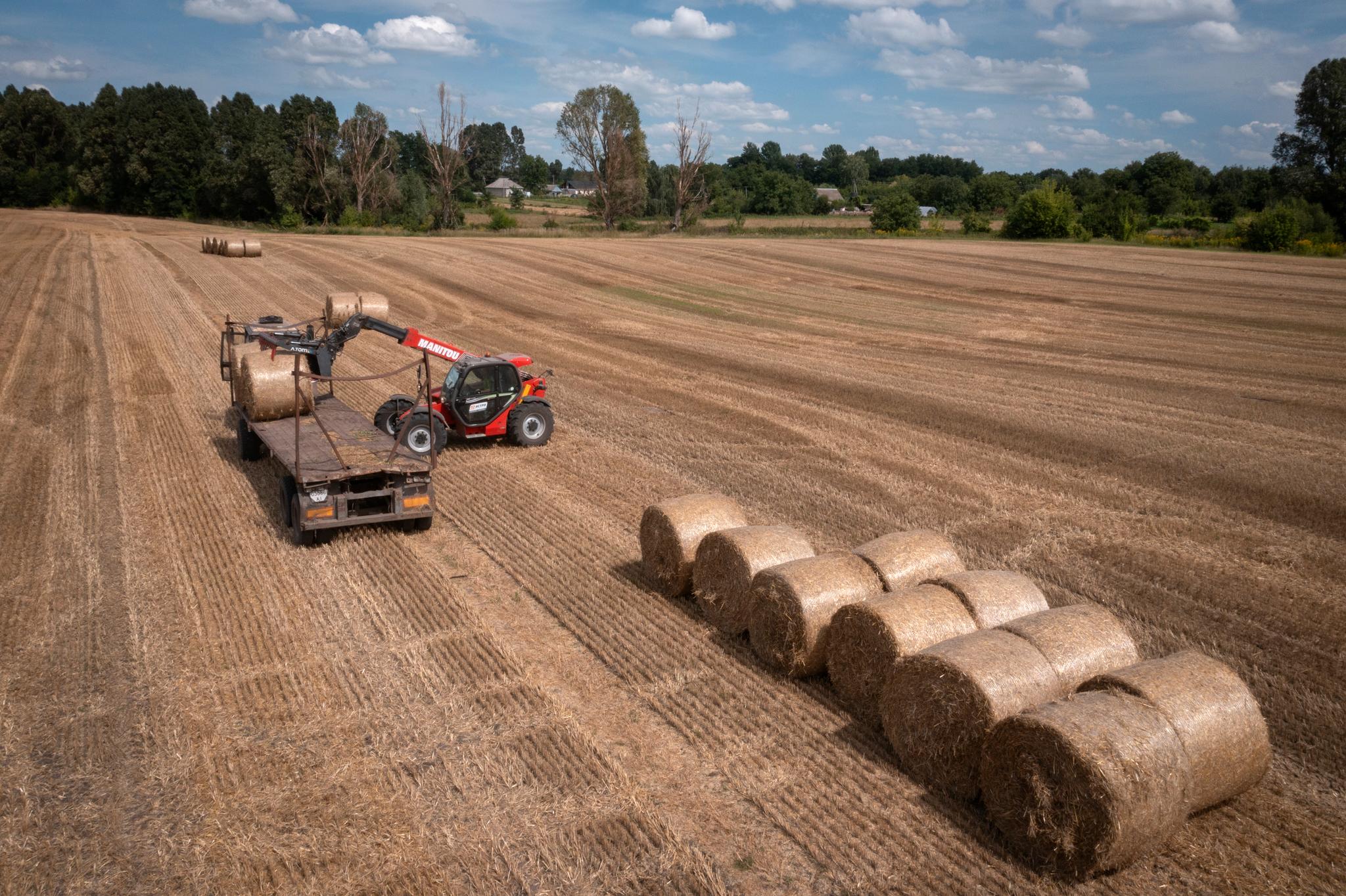Viktor Zvik has finished harvesting, but with transportation costs soaring and Russian ports blockaded, it is almost impossible for a Ukrainian farmer to sell the grain.

A tractor lifts hay bales on a farm in Zjurivka in Kiev.
Tsvyk harvested a total of 4,800 tons of wheat on his fields in August. But after Russia refused to extend the grain agreement so that Ukraine could export grain across the Black Sea, he had no idea where the wheat would go.
He also does not know how to secure the future of his farm.

Viktor Zwick holds a grain of wheat in his hand. Sky-high transportation costs mean he probably won’t be able to export them.
Tsvyk, which usually sends up to 90 percent of its crops to the southern port city of Odessa, is in the middle of a crisis. He has managed to produce 20 percent more than last year, which would be a boon in peacetime, but not when the country is at war.
The Russian blockade of Ukrainian ports and the high costs associated with other export routes mean that there is no longer any gain from selling the grain.
– Too bad
Thousands of Ukrainian farmers suffer from the same dilemma as Zvik.
– It’s too painful to talk about, says the 67-year-old when asked what the future looks like.
In July, Russia refused to extend the grain agreement with Ukraine despite intense negotiations involving both the United Nations and Turkey. The Russians believe they have not received enough assistance to export their food and fertilizer. They are also calling for reduced penalties.

Ukrainian farmers are burning with tons of wheat after Russia refused to extend a grain agreement that made it possible to transport grain across the Black Sea.
As a result, ships loaded with food en route from Ukraine to Turkey no longer had any protection. Russian shells or missiles can hit them at any time.
After the grain agreement expired, Russia escalated its attacks against Ukrainian ports, granaries, and other infrastructure related to agriculture. Ukraine, for its part, attacked one of the Russian ports, which had a significant impact on the cost of wheat and corn on the world market.
Uncertain future
While a number of countries in the world are pushing for the restoration of the grain agreement, fighting has become more intense in the Black Sea. At the same time, Ukrainian farmers are thinking about how they will be able to survive and produce the food necessary for the population of countries experiencing an acute food shortage.

A worker collects wheat in a grain depot on a farm in Zgorievka, outside Kiev. The August crop yielded 4,800 tons of wheat, but so far nothing has been sold.
Tsvyk no longer knew what to do with the crops, or how to pay his 77 workers.
– What should I feel in this situation? It’s a great sadness for everyone, he told the AP news agency.
His farm is located in Shuryvka, 120 kilometers from the capital, Kiev. It produces not only wheat, but also goat cheese and various drinks. Workers work around the clock to turn the milk into cheese, kefir, and yogurt drinks, which are then packaged and shipped for sale across Ukraine.
began to see
Four of Tsvyk’s servants left to take part in the battles, while the rest were responsible for the harvest. Now they are looking at the huge fields that belong to the farm.
But mystery hangs in the air. Grain is the main source of income for Ukrainian farmers, and the now blocked port of Odessa was the main shipping point for transporting grain to the world.

Farmer Viktor Zvik at the farm’s cheese warehouse in Zgorievka, outside Kiev. He is trying to invest in other products now that grain exports are next to impossible.
Tsvyk says his products have been exported to India and countries in North Africa. But now they are likely to remain in stock, which means he loses out on hundreds of thousands of kronor in income.
The alternative is to ship the grain out of the country by truck, train or riverboat, across Europe, where farmers have responded furiously to cheap Ukrainian grain that rivals locally produced goods.
Last year, Tsvyk left behind 1,500 tons of grain, which he could not sell. This year he fears not being able to sell anything.
plant less
The bleak outlook for the future also means that farmers are planting less than before: corn and wheat production in Ukraine this year is 40 percent lower than before the war, according to analysts’ estimates.
It was exorbitant transportation costs that devastated Tsvyk last year. Because war increases risks during transportation, all parts of supply chains are affected. This has caused some farmers to invest in new products in an effort to secure a certain income.
Oleksandr Sevogorlu, an agronomist in Tsvyk, emphasizes that the soil must be plowed and taken care of anyway.
– There are some transportation routes across the Danube, but they are very limited, he said.
Russia has also attacked some Ukrainian ports on the Danube, which has created uncertainty about whether this transport route will work.
swap
Another way to adapt is to replace parts of the grain with better fertilizer, hoping to improve the quality of next year’s wheat.
Tsvyk also decided to make other products that he knew could be sold without the costs being prohibitive, such as sunflower and rapeseed oil. In this way, it becomes less dependent on grain exports.
– We cover our losses with these products, says Sivogorlo.
It is difficult to predict now what will happen to wheat exports. He adds that everything depends on exports.
With this strategy, Tsvyk hopes to break even. It’s at least better than running around in confusion, as other cultivators know.

“Organizer. Social media geek. General communicator. Bacon scholar. Proud pop culture trailblazer.”
